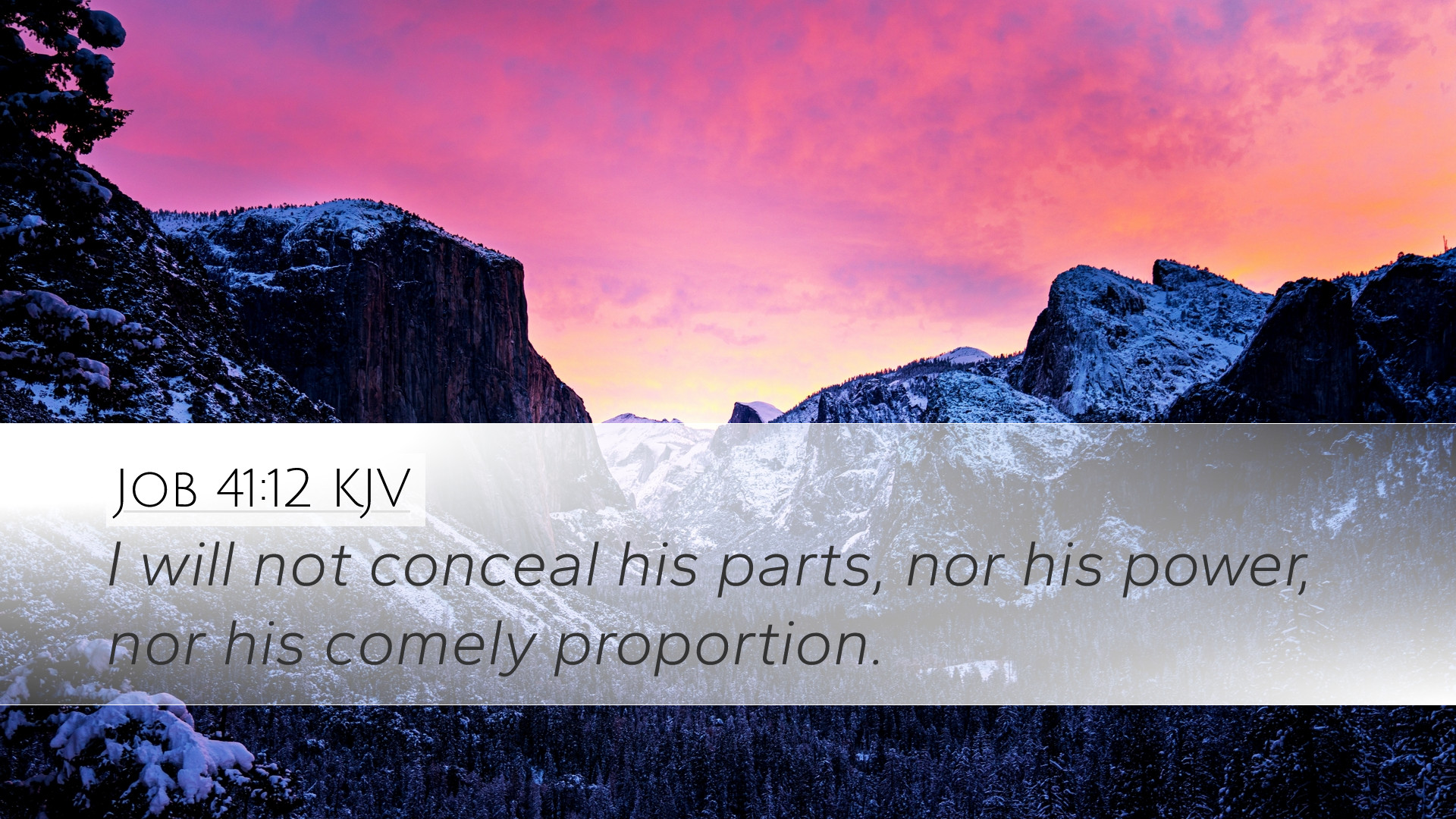Commentary on Job 41:12
Introduction
Job 41:12 states: "I would not conceal his parts, nor his power, nor his comely proportion." This verse is part of God's response to Job, where God describes the Leviathan, a creature symbolizing chaos and unimaginable power. The implications of this verse reach deep into theological discussions concerning God’s sovereignty, the nature of creation, and the creaturely response to divine majesty.
Contextual Background
The Book of Job wrestles with profound questions of suffering and divine justice within the context of a righteous man’s trials. Job’s friends offer various perspectives, often rooted in traditional wisdom, blaming Job’s suffering on personal sin. However, God’s response throughout the latter chapters (particularly in chapters 38-41) shifts the focus from Job’s condition to the majesty and wisdom of God in creation.
The Majesty of Creation
1. A Declaration of Divine Power
In this passage, God highlights His creation's splendor through the Leviathan. Notably, commentators like Matthew Henry emphasize that the Leviathan serves as a reminder of God's might. He states that this creature, though daunting and fearsome, is ultimately under God’s dominion. This presents a theological imperative: recognizing that all things, even those that seem uncontrollable, are orchestrated by the Almighty.
2. Accepting the Incomprehensible
Albert Barnes notes the necessity of humility in the face of God's creation. The text invites listeners and readers to ponder what they cannot understand. The characteristics of the Leviathan – its strength and beauty – serve as metaphors for God’s unfathomable wisdom and authority. Instead of attempting to question God's justice, believers are encouraged to marvel at His creative genius and not presuppose a complete comprehension of His purposes.
Understanding the Leviathan
1. Symbol of Chaos
Adam Clarke refers to the Leviathan as a representation of chaos and disorder against which God exercises His will. The biblical text invites reflection on how individuals confront their own 'Leviathans'—those overwhelming challenges or adversities that threaten to disrupt their lives. In this light, the verse speaks to believers as they navigate the complexities of faith in the modern world. They are reminded that their struggles, no matter how great, are ultimately a part of God’s sovereignty.
2. The Call to Acknowledge God’s Control
The acknowledgment of not concealing the Leviathan’s attributes reflects an invitation to see the divine purpose in both creation and calamity. Commentators argue that while the chaos ensues in Job's life, the ultimate control lies with God, who is more powerful than the creature (or circumstance) instilling fear. This perspective provides pastors and theologians with a rich framework to discuss theodicy with their congregations.
Theological Implications
1. The Importance of Perspective
This verse emphasizes the need for believers to maintain a God-centered perspective in their trials. It teaches that the acknowledgment of God's sovereignty over all creation helps mitigate despair in suffering.
2. Declaration of God’s Attributes
The acknowledgment of God's creations, particularly through the Leviathan, showcases His omnipotence and majesty. The verse insists that understanding these attributes is essential for grasping the nature of faith. When confronted with immense challenges, recognizing the greatness of God can inspire trust and hope in His promises.
Practical Applications for Ministry
Pastors and leaders can draw from the insights related to Job 41:12 in several impactful ways:
- Encouragement to the Suffering: When guiding individuals through hardship, emphasize the sovereignty of God over chaos. This brings comfort in understanding that God is not indifferent but is actively engaged in His creation.
- Preaching on God’s Power: Use the imagery of the Leviathan to preach about God’s control over life's circumstances, emphasizing faith amidst chaos and uncertainty.
- Discipleship in Humility: Teach congregants to respond to the mysteries of life with humility, recognizing that not all questions will have answers. Encouraging a posture of reverence towards God’s ways fosters a deep faith.
Conclusion
Job 41:12 encapsulates a profound truth about the relationship between creation and the Creator. The imagery of the Leviathan serves not only as a metaphor for chaos and strength but also as a reminder of God’s sovereignty. For pastors, students, and theologians alike, the insights derived from this verse allow for a richer understanding of faith amidst adversity. They highlight the importance of recognizing God’s grandeur and demonstrate how believers can sustain hope in the face of life’s overwhelming challenges.


